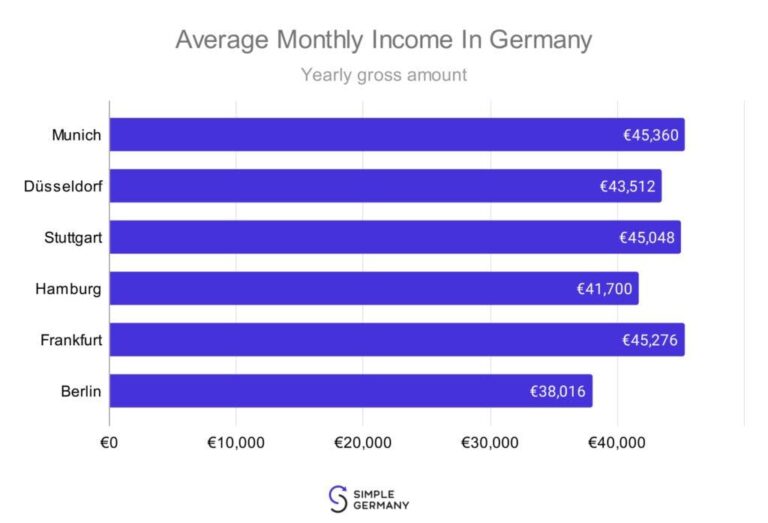Germany is set to increase its minimum wage to €14.60 per hour by 2027, marking a significant step in the country’s ongoing efforts to improve income security for low-wage workers. The planned raise, announced by government officials and widely reported by Deutsche Welle (DW), reflects growing political consensus around fair pay amid rising living costs. This incremental hike aims to enhance purchasing power and reduce wage disparities, while sparking debate among employers, labor unions, and economists about its potential economic impact.
Implications of Germany’s Minimum Wage Increase on Workers and Businesses
The planned increase of the minimum wage to €14.60 by 2027 is poised to reshape the economic landscape for both employees and employers across Germany. For workers, this adjustment means a notable boost in disposable income, which is expected to improve living standards, reduce poverty rates, and stimulate consumer spending. Low-wage workers, particularly in sectors such as retail, hospitality, and personal services, will likely feel the most immediate impact, potentially leading to increased job satisfaction and lower turnover rates. However, some analysts caution that the wage hike must be balanced carefully to avoid inflationary pressures that could diminish the purchasing power gained.
On the business front, small and medium-sized enterprises (SMEs) face both challenges and opportunities. While higher wages will increase operational costs, companies may respond by improving productivity or investing in automation technologies. The table below summarizes key implications:
| Impact Area | Positive Effects | Potential Challenges |
|---|---|---|
| Workers | Higher income, increased morale | Risk of inflation eroding gains |
| Businesses | Improved staff retention, innovation incentives | Increased labor costs, potential price hikes |
- Government support measures could ease the transition for vulnerable businesses.
- Sector-specific wage adjustments may help mitigate negative impacts in sensitive industries.
- Long-term effects will depend on economic trends and labor market flexibility.
Economic Challenges and Opportunities Arising from the Wage Hike
The planned increase in Germany’s minimum wage to €14.60 by 2027 is set to generate a complex mix of economic responses. On one hand, workers in lower-income brackets will see enhanced purchasing power, potentially reducing income inequality and stimulating domestic consumption. This wage adjustment aims to provide financial relief for millions, thereby supporting demand in various sectors such as retail, hospitality, and services. Businesses may also benefit from increased consumer spending, leading to potential growth opportunities despite initial higher labor costs.
However, the wage hike presents notable challenges. Small and medium enterprises (SMEs), especially in labor-intensive industries, might face pressure on profit margins, prompting discussions on automation and workforce restructuring. Economic analysts highlight key issues and opportunities:
- Cost management: Companies will need to optimize operations to absorb increased wage expenses without sacrificing competitiveness.
- Employment effects: Risks of reduced hiring or part-time job shifts could arise, requiring close monitoring by policymakers.
- Productivity gains: Higher wages might incentivize improvements in worker productivity and job satisfaction.
- Regional disparities: The impact will vary, with some regions facing greater strain based on local economic conditions.
| Sector | Potential Impact | Opportunity |
|---|---|---|
| Retail | Higher labor costs | Increased local consumption |
| Manufacturing | Pressure to automate | Efficiency improvements |
| Hospitality | Reduced margins | Better employee retention |
Policy Recommendations for Ensuring a Balanced Transition to Higher Wages
Policymakers must adopt a multifaceted approach to mitigate potential economic disruptions while implementing the new minimum wage increase. Gradual phased implementation combined with targeted support for small and medium-sized enterprises (SMEs) can alleviate pressure on businesses still recovering from the pandemic’s economic impact. Additionally, incentivizing investments in automation and workforce training will help companies enhance productivity and absorb higher labor costs without significant layoffs.
To foster social equity alongside economic stability, it is crucial to:
- Strengthen social safety nets, including housing and childcare subsidies.
- Enhance vocational education to align skills with rising job market demands.
- Encourage regional policies that address disparities between urban and rural wage dynamics.
Such tailored measures will ensure that wage growth contributes positively to Germany’s broader economic and social objectives, minimizing inflationary risks while promoting inclusive prosperity.
| Policy Area | Recommendation | Expected Impact |
|---|---|---|
| SME Support | Tax relief & grants | Business resilience |
| Workforce Training | Upskilling programs | Increased productivity |
| Social Safety Nets | Expanded benefits | Reduced poverty risk |
| Regional Policies | Targeted subsidies | Balanced regional growth |
Concluding Remarks
As Germany moves to increase its minimum wage to €14.60 by 2027, the decision marks a significant shift in the country’s labor policy aimed at enhancing workers’ purchasing power amid rising living costs. While supporters argue the raise will help reduce income inequality and stimulate domestic demand, critics caution about potential impacts on small businesses and employment rates. As the timeline progresses, economists and policymakers will closely monitor the effects of the wage hike on Germany’s economy and labor market.




